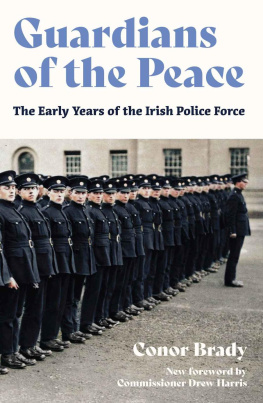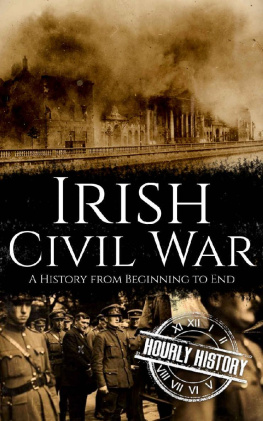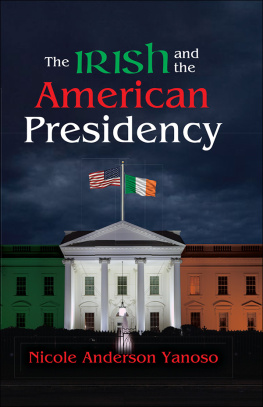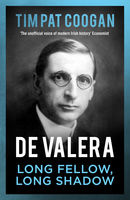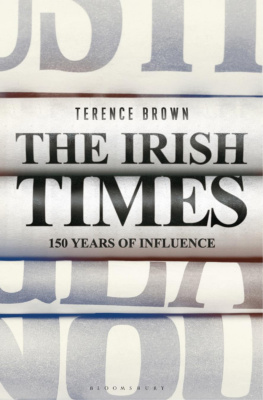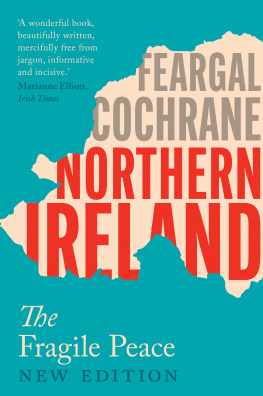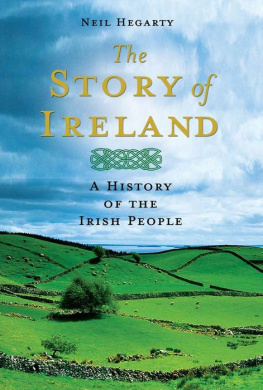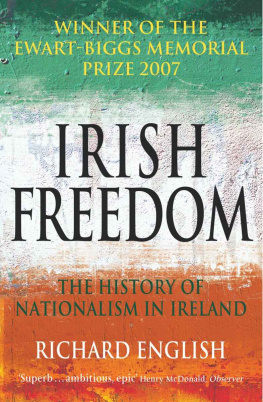ABOUT THE AUTHOR
Conor Brady is former editor of The Irish Times and former member of the Garda Ombudsman Commission. He is an Honorary Professor of Journalism at NUI Galway and is chair of the Top Level Appointments Committee. He is the author of numerous books, both non-fiction and fiction.

GUARDIANS OF THE PEACE
First published in 1974 by Gill and Macmillan, this edition published in 2022 by
New Island Books
Glenshesk House
10 Richview Office Park
Clonskeagh
Dublin D14 V8C4
Republic of Ireland
www.newisland.ie
Copyright Conor Brady, 1974, 2022
Foreword Drew Harris, 2022
The right of Conor Brady to be identified as the author of this work has been asserted in accordance with the provisions of the Copyright and Related Rights Act, 2000.
Print ISBN: 978-1-84840-841-8
eBook ISBN: 978-1-84840-842-5
All rights reserved. The material in this publication is protected by copyright law. Except as may be permitted by law, no part of the material may be reproduced (including by storage in a retrieval system) or transmitted in any form or by any means; adapted; rented or lent without the written permission of the copyright owners.
Every effort has been made to trace the copyright holders and obtain permission to reproduce the photographs in this book. Please do get in touch with any enquiries or any information relating to these images or the rights holder.
British Library Cataloguing in Publication Data. A CIP catalogue record for this book is available from the British Library.
New Island Books is a member of Publishing Ireland.
For my wife, Ann
ALSO BY CONOR BRADY
The Guarding of Ireland
The Garda Sochna and the Irish State 19602014
CONTENTS
FOREWORD
Commissioner Drew Harris
As the Garda Sochna marks the centenary of its foundation in 1922, it is timely and appropriate that Conor Bradys Guardians of the Peace, telling the story of the services formation and the struggles of its early years, should be re-published by New Island Books.
As Commissioner (the twenty-first person to hold this post since the foundation of the State) I welcome the opportunity provided by this publication to revisit the achievements of the early generations of garda and to reflect on the values and principles upon which the organisation has operated in its 100 years of service to people of Ireland.
Social, economic and political circumstances in twenty-first-century Ireland are profoundly different from those in 1922. The task of policing has become more complex and multi-faceted. Technology has changed almost every aspect of police work, as it has changed so much right across society. The communitys expectations, both of the police as a public service and of the individual police officer, are more demanding. Rightly, there is a greater emphasis on transparency and accountability in the way that police officers discharge their responsibilities.
But the personal qualities demanded of the police officer and the underlying values that inform his or her work are constant. Just as the founding members needed qualities of courage, judgement, fairness and integrity, so too do the Garda of the twenty-first century. The founding garda had to be independent of politics and loyal to their duty under the law, regardless of whatever pressures might be presented. They had to have a sense of patriotism and a deep awareness of their special place and their special responsibilities to the community. So too, do their successors in office in the twenty-first century.
The services very name and the title of this book evoke the essence of what the Garda Sochna has been about since its foundation. Its role is to preserve the peoples peace, to prevent the visitation of crime and violence upon the citizen and to protect and guard all citizens while vindicating their rights in their day-to-day lives. Its record in achieving these aims is impressive. Where, on occasion, as with every man-made institution, it may have fallen short, it has endeavoured with honesty and with energy to make good.
Above all and this theme runs through the narrative of Guardians of the Peace from its inception, the Garda Sochna has been a police service that is rooted in the community and that exercises its policing functions with the communitys consent. As my first predecessor in office, Commissioner Michael Staines, told the early members, the force was to succeed, not by force of arms or numbers but by their moral authority as servants of the people.
The author is well placed to tell the story of the Garda Sochna. He was editor of The Garda Review from 1973 to 1975 and later wrote extensively for The Irish Times on policing and security matters. In 2006 he was appointed by the President of Ireland, with the approval of the government and the Houses of the Oireachtas, to serve as a founding commissioner of the Garda Sochna Ombudsman Commission. He served as a member of the Commission on the Future of Policing which reported to government in September 2018. His late father, Superintendent Cornelius Brady, was a founding member of the service.
As he writes in his introduction, the story of the early decades of the Garda Sochna is that of ordinary men doing an extraordinary job. They earned their place in the history of the Irish State with distinction and members of the Garda Sochna today continue to serve their station with great distinction.
INTRODUCTION
Perhaps one of the most instructive tests of a democracy is the way its police services operate. In their relationship with the community, in their accountability, in their operations and in their overall conduct, the police are almost invariably a mirror-image of the broad values of the society they serve. In few countries is this as true as in the Republic of Ireland.
When this account of the foundation of the Garda Sochna was first published by Gill & Macmillan in 1974, the force was little more than fifty years old. When the second edition, undertaken by Prendiville Publishing, appeared in 2000, it was emerging from a period of more than thirty years in which it had been primarily operating to deal with the violence that flowed from The Troubles in Northern Ireland. With this publication by New Island Books, it is marking its centenary in supposedly peace-time conditions. Yet the challenges facing it and the expectations of the community it serves have never been greater.
It is hoped that this latest publication, coinciding with the centenary of the forces establishment, can serve to evoke the ideals and the founding principles adopted in 1922 and perhaps help to re-interpret and re-apply them in a twenty-first century context. The force was proclaimed by its early Commissioners to be the servants of the Irish people. Its values were to be the values of the community. Its loyalty would be to the State and it would be accountable to the democratically elected government of the State. After a brief period during the Civil War when it was envisaged as an armed force, it was to be routinely unarmed. It would succeed, Commissioner Michael Staines declared, not by force of arms or numbers but on its moral authority as the servants of the people.
The Garda Sochna, originally and briefly known as the Civic Guard, was to have certain unique characteristics that marked it out from other police forces. Policing in Britain was organised on a county basis but the Garda Sochna was to be a national force, covering all twenty-six counties of the new State. Most European countries have a number of layers of policing at local, regional and national level. The Irish Free State was to have no such arrangements. Perhaps most significantly of all, the Garda Sochna was to discharge both the functions of a civil police force and those of a national security service. This remains the situation today, conferring a role on the force that is unique in western policing systems.
Next page
